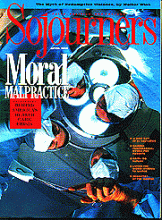Children have much to teach us about peacemaking and God's presence. Their seemingly unlimited contact with creation and the Creator is blessedly free of liturgical rules, politically correct guidelines, or papal encyclicals. They know God as a breath of wind or as a squirrel skipping across a telephone wire. They know God even though they can't describe, document, or justify.
It's inevitable that a part of this awe and wonder is forever lost as children enter into the distractions of grown-up life. But how much of this awe and wonder must be lost? And how is it lost? These are questions asked by parents and educators who believe that a child's innate and joyful sense of God does not have to be threatened by, or is not incompatible with, exposure to the political and socioeconomic realities that shape our world today.
The past two years have seen an increase in the number of books, articles, and magazines that can revolutionize a parent's bookshelf which, until now, may have only included a couple of dog-eared volumes by Dr. Benjamin Spock and how-to parenting manuals. Many of the books address a specific topic, such as peacemaking activities at home or school, encouragement on how to get kids socially or environmentally involved, conflict resolution, the impact of television and war toys on our children's psyches, and arguments against corporal punishment.
Read the Full Article

